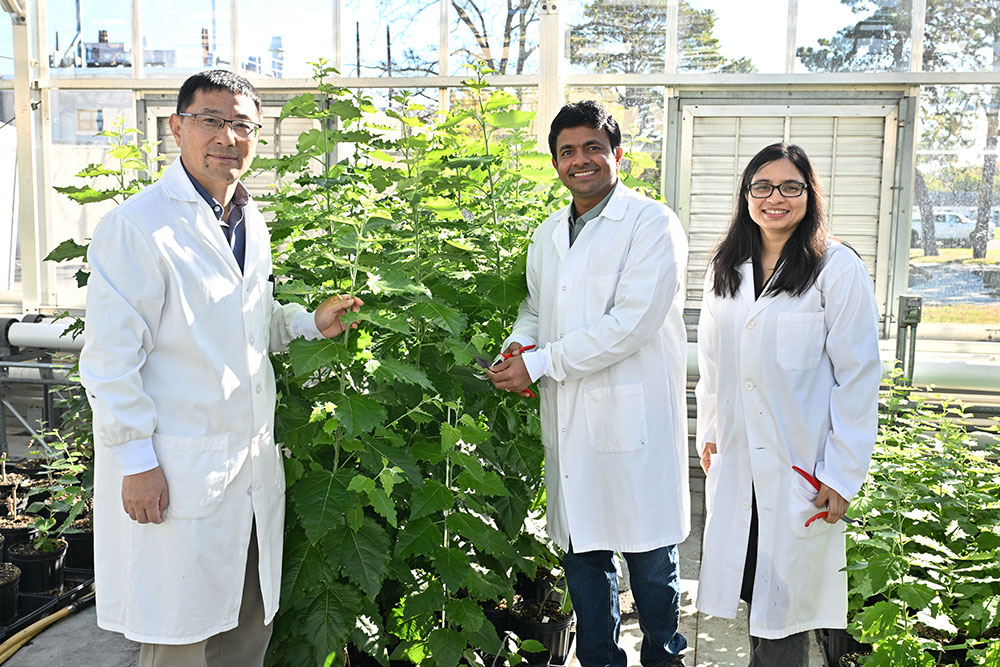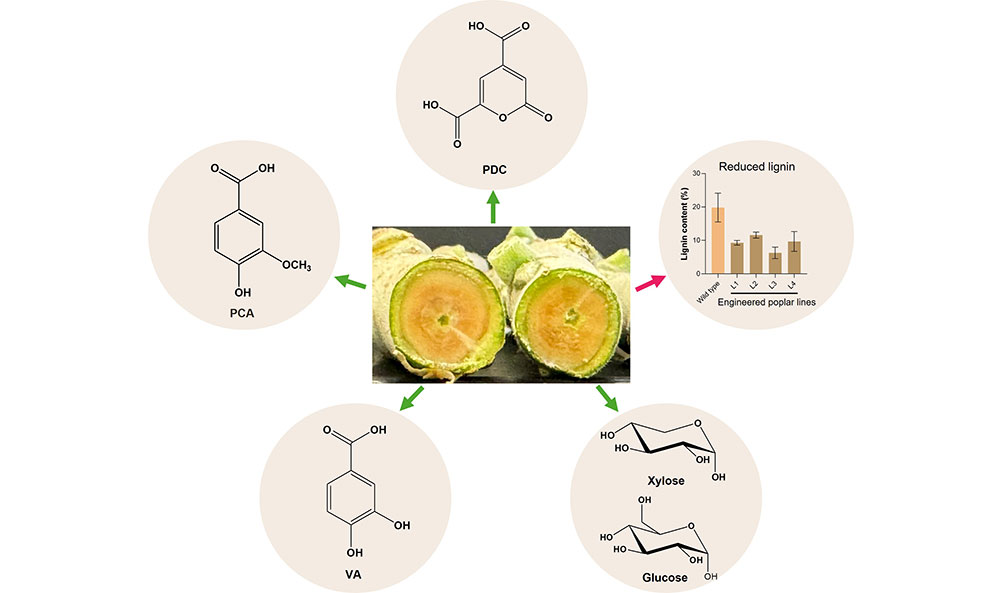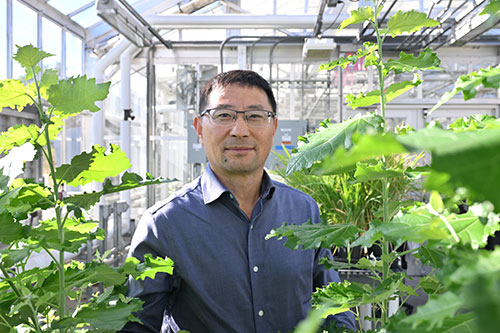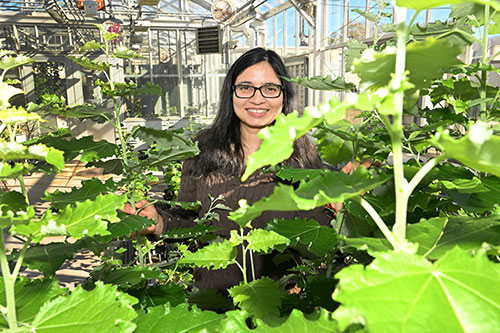Scientists Harness Plants' Plasticity to Make Key Industrial Chemical
Precursor for degradable plastics among products of poplar trees engineered to boost bioenergy and bio-manufacturing
November 19, 2025
 enlarge
enlarge
Brookhaven Lab biologists Chang-Jun Liu, Vijaya Vulavala, and Nidhi Dwivedi in the greenhouse at Brookhaven National Laboratory with poplar trees. The team engineered poplar to produce industrial chemicals and to improve the plants' biochemical composition for easier processing into biofuels. (Kevin Coughlin/Brookhaven National Laboratory)
UPTON, N.Y. — A team led by scientists at the U.S. Department of Energy’s (DOE) Brookhaven National Laboratory has engineered poplar trees to produce valuable chemicals that can be used to make biodegradable plastics and other products. The modified trees were more tolerant of high salt levels in soil and were easier to break down for conversion into biofuels and other bioproducts.
The study, published in Plant Biotechnology Journal, shows that poplar trees, which are already useful as a bioenergy crop, can be reprogrammed at the genetic level to act as living factories for producing high-value materials. This approach for making important raw materials could help establish a flexible domestic supply chain, potentially lowering costs and reducing reliance on imported specialty chemicals.
“This study demonstrates the metabolic ‘plasticity,’ or flexibility, of poplar and the feasibility of engineering stress-resistant crops to produce multiple desired products,” said Brookhaven Lab biologist Chang-Jun Liu, who led the research. “It’s an example of how basic biological discoveries that help us understand metabolic processes in plants can lead to real-world practical applications.”
The study team included collaborators at the Joint BioEnergy Institute, which is managed by DOE’s Lawrence Berkeley National Laboratory, and at Kyoto University.
 enlarge
enlarge
Engineered poplar, shown in the cross-section photo, can produce high levels of valuable bioproducts. These include: 2-pyrone-4,6-dicarboxylic acid (PDC), which can be used to make degradable plastics, and protocatechuic acid (PCA) and vanillic acid (VA), which both have industrial and pharmaceutical applications. The engineered poplar also had reduced cell wall lignin content (graph). This enhances the release of simple sugars such as xylose and glucose that can be refined into biofuels and other bioproducts. (Brookhaven National Laboratory)
Re-engineering poplar
The team modified hybrid poplar trees to produce 2-pyrone-4,6-dicarboxylic acid (PDC) — a compound used to make durable, high-performance plastics and coatings. This compound is normally generated through complex chemical processes or by using bacteria and other microbes to break down biomass.
The Brookhaven team moved the microbial process into the plants by inserting five genes from naturally occurring soil microbes into hybrid poplar trees. These genes make up a synthetic metabolic pathway that redirects part of the plant’s metabolic system to produce PDC and other related compounds, including protocatechuic acid and vanillic acid, both of which have industrial and pharmaceutical uses.
“Poplar grows quickly, adapts to many environments, and is easy to propagate,” said Nidhi Dwivedi, who works with Liu in Brookhaven Lab’s Biology Department. “By adding this new pathway, we’re expanding the range of bioproducts these trees can produce.”
Other beneficial changes
The genetic modifications changed the poplar trees’ internal chemistry in other useful ways. Specifically, the cell walls of the engineered plants contained lower levels of lignin, an organic “woody” polymer that makes biomass difficult to break down. At the same time, the cell walls had higher levels of hemicellulose, a type of complex sugar that can be used for biochemical conversions. With less lignin and more extractible sugars, the modified trees yielded up to 25% more glucose and 2.5 times more xylose — key ingredients for making biofuels and other bioproducts.
The metabolic changes also caused a higher amount of a waxy substance called suberin to accumulate in the bark and roots of the poplar trees. Suberin protects plant tissues, helps them retain water and nutrients, and blocks toxins — allowing the modified poplar trees to grow in less-than-ideal conditions, including salty soil.
“These trees can grow on soil not suitable for food production, so they won’t compete for prime agricultural land,” said Dwivedi. “When they are stressed by high salt levels, they produce even higher levels of bioproducts than when they are not stressed.”
So far, the results have come from greenhouse-grown plants. The next step is to test the engineered poplars under field conditions to confirm their performance and long-term stability. The team will continue to optimize the metabolic pathway for even higher yields of PDC and related compounds.
The researchers point out that this model for plant-based manufacturing is easily modifiable and scalable to meet changing demands without the upfront investment required for conventional chemical manufacturing facilities.
“This work gives us a deeper understanding of plant metabolism,” said Liu. “Using different combinations of genes, we can potentially make additional products. This knowledge will help researchers design productive crops for a range of U.S. manufacturing and agricultural needs.”
The study was supported by the DOE Office of Science through the Joint BioEnergy Institute, with additional funding for the collaborators at Kyoto University from Japan’s Society for the Promotion of Science.
Brookhaven National Laboratory is supported by the Office of Science of the U.S. Department of Energy. The Office of Science is the single largest supporter of basic research in the physical sciences in the United States and is working to address some of the most pressing challenges of our time. For more information, visit science.energy.gov.
Follow @BrookhavenLab on social media. Find us on Instagram, LinkedIn, X, and Facebook.
2025-22691 | INT/EXT | Newsroom











